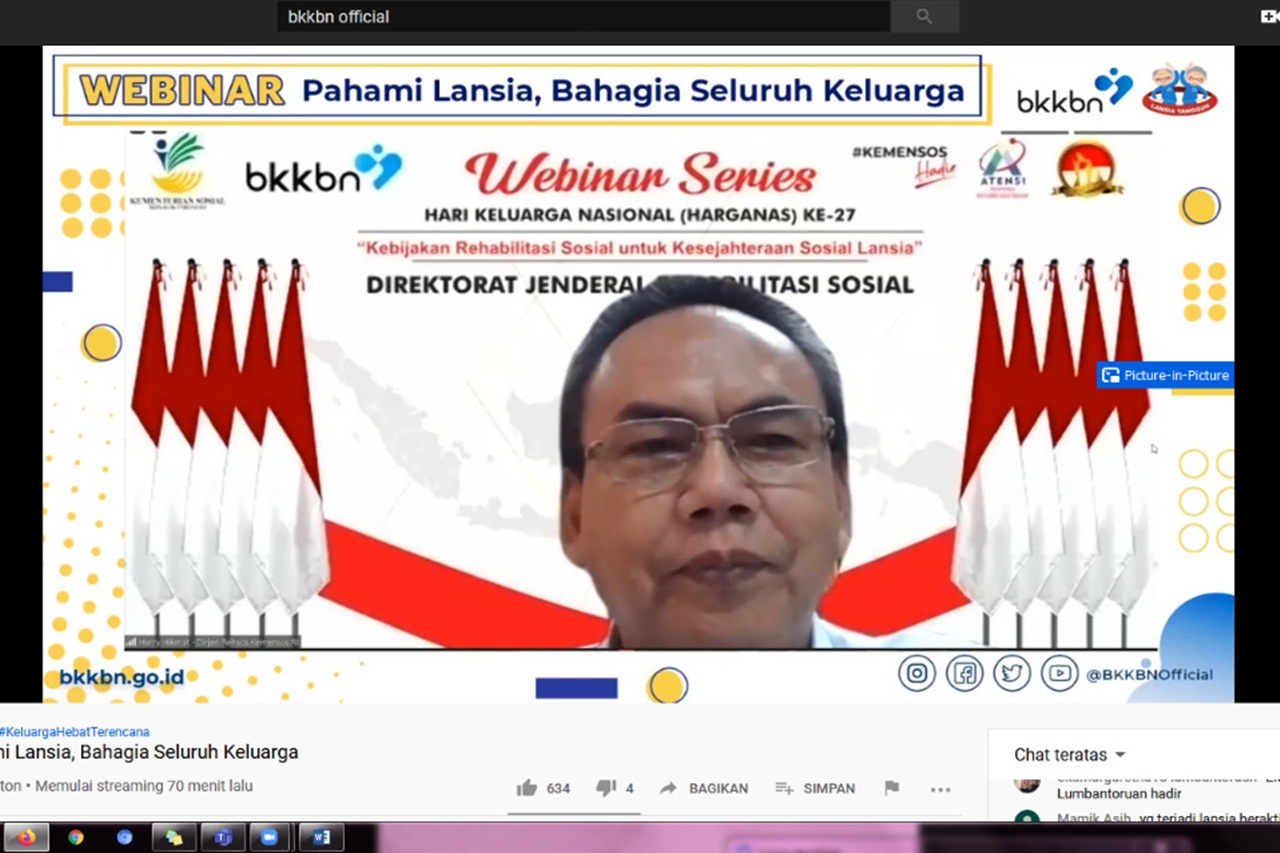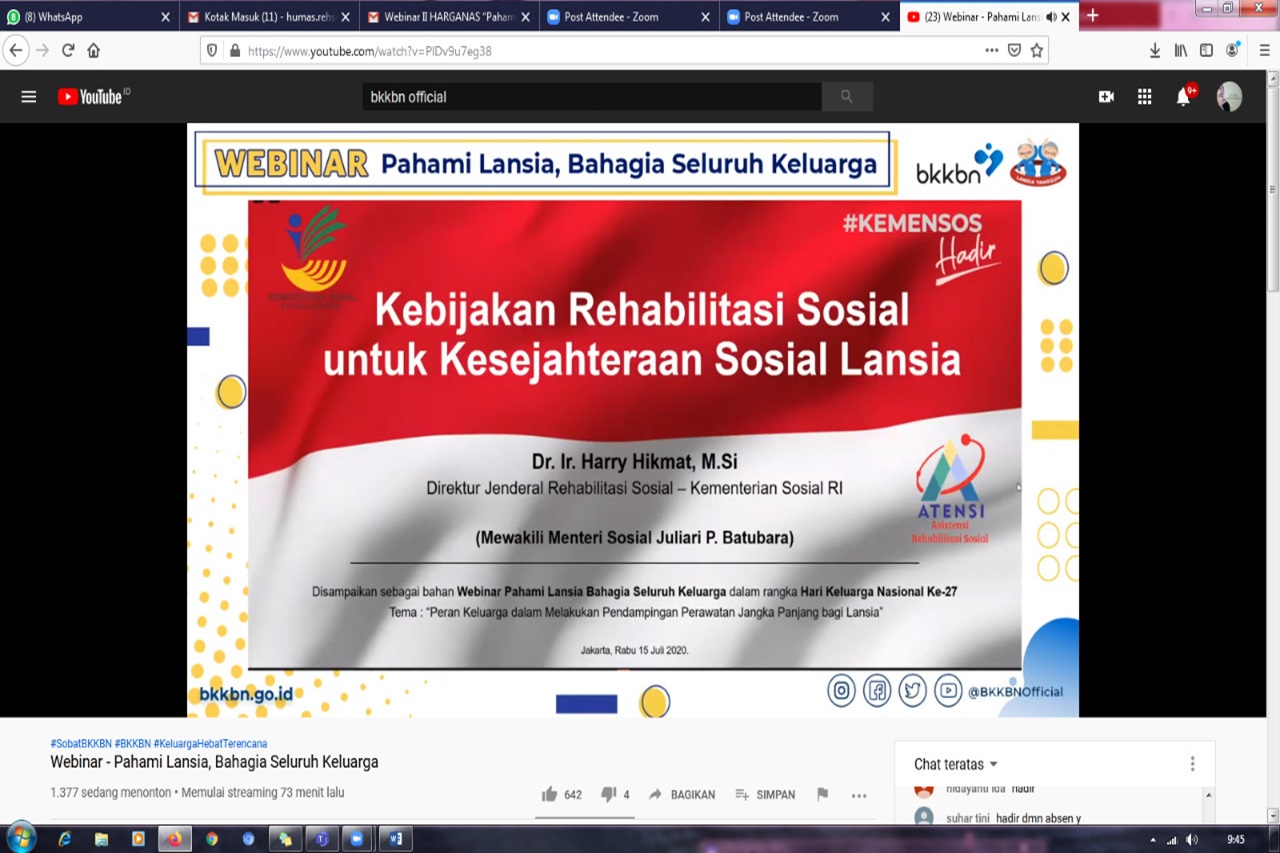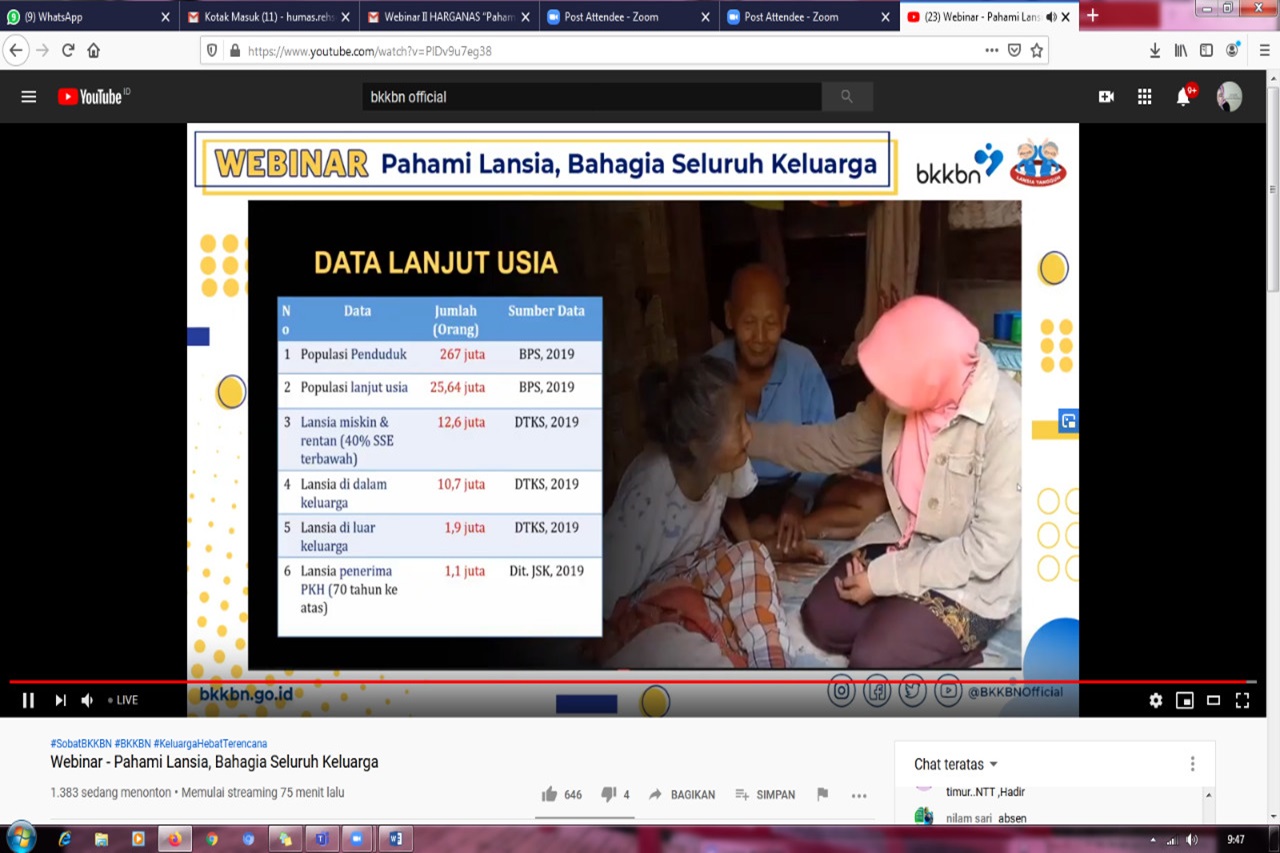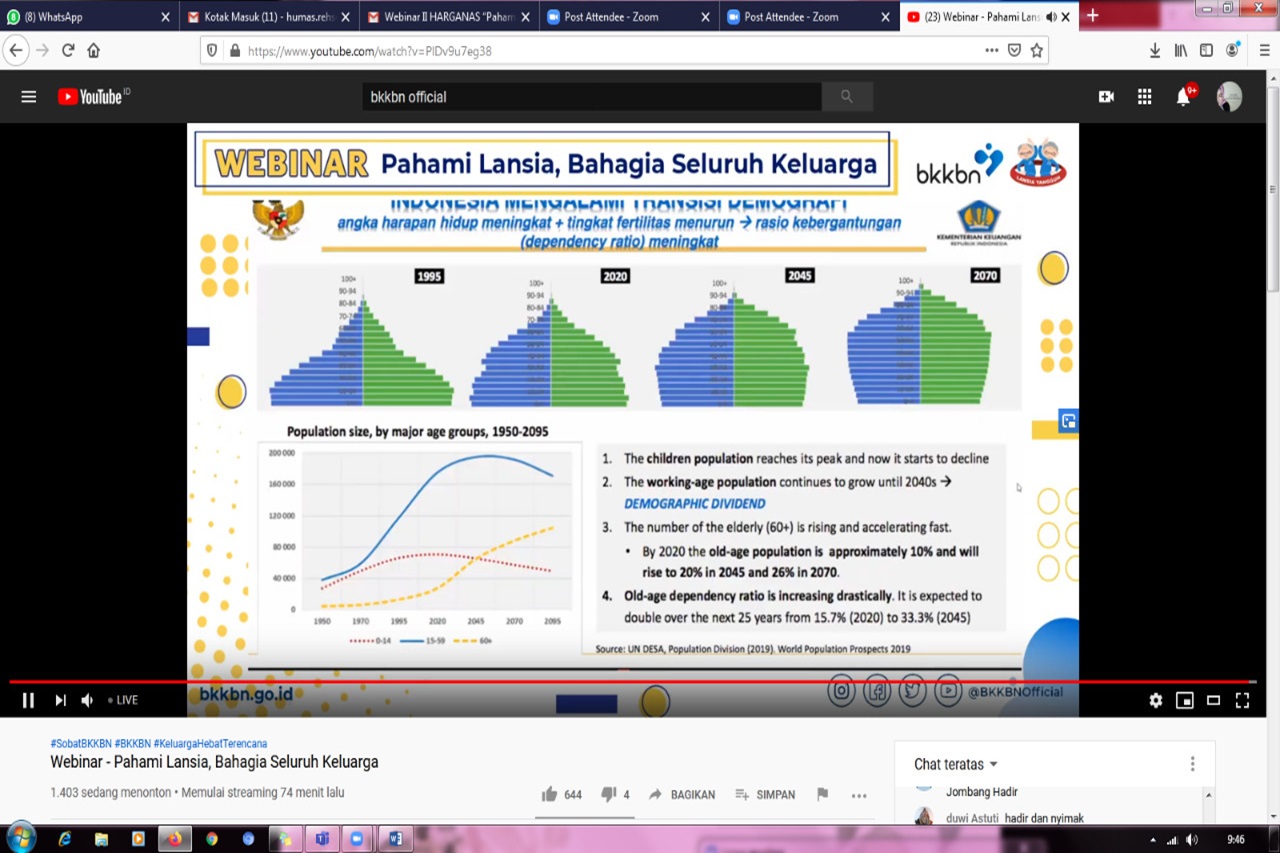JAKARTA (July 15, 2020) - The Director General of Social Rehabilitation, Harry Hikmat representing the Indonesian Minister of Social Affairs, Juliari P. Batubara was a speaker in a Webinar with the theme "Understanding the Elderly, Happy the Whole Family". This webinar was organized by the National Population and Family Planning Agency (BKKBN) in the context of the 27th National Family Day (harganas) in 2020.
The Director General of Social Rehabilitation delivered material on the Social Rehabilitation Policy for the Elderly Social Welfare. "This policy is made so that the elderly are not seen as a burden to the population, but the elderly have the potential to guard this nation," he said.
Elderly data recorded in the Social Welfare Integrated Data (DTKS) belonging to the Ministry of Social Affairs in 2019 as many as 12.6 million poor and vulnerable elderly (40% of the lowest economy social status), 10.7 million elderly in the family and 1.9 million elderly outside family.
Then, based on data from the Statistics Indonesia (BPS) in 2020, the elderly population is 25.64 million people. From the number above, it shows that the number of elderly people has touched 9.6% of the total population of Indonesia and will experience an aging population.
Head of the BKKBN, Hasto Wardoyo added that if the number of elderly people reaches 10% of the total population in Indonesia, then we are entering a period of aging population where more and more elderly people have to live with productive age.
"This large number of elderly people will become a problem for the country and the nation if the quality of life of the elderly is not available," said M. Yani, Deputy for Family Welfare and Family Empowerment at the BKKBN.
The Director General of Social Rehabilitation said that the Ministry of Social Affairs exists for the social welfare of the elderly with the Social Rehabilitation Assistance (ATENSI) policy. The direction of this policy is in the form of strengthening the social rehabilitation system that is integrated with the protection of the elderly.
In addition, the Ministry of Social Affairs is here to expand the reach of family, community and residential-based elderly protection, to strengthen the capacity and institutions of the Social Rehabilitation Center and the Elderly Social Welfare Institution (LKS), to increase the old age campaign in all sectors and to increase the role of the community and the private sector in elderly social services.
"We agreed to put the family first in terms of social rehabilitation for the elderly," said the Director General of Social Rehabilitation. The Ministry of Social Affairs prioritizes a family-based approach. If the family is limited to handling it, it can be done by LKS in the community or center as a residential based.
The Elderly ATENSI Business Process is carried out based on an initial assessment to determine the services provided. Family-based attention is preferred because the family is the place where the elderly fulfill their physical, psychological needs and the family is the best place for the elderly. The ATENSI process will be escorted by the facilitators/social workers.
Thanks to his thoroughness in taking care of his parents who suffer from diabetes, by not limiting them, they will feel happy and enjoy. This treatment made his parents blood glucose condition in good condition.
"Community-based attention is given when families experience limitations in dealing with the elderly," said the Director General of Social Affairs. The community as the closest environment for the elderly is also accompanied by LKS to be more sensitive and responsive in preventing and solving problems experienced by the elderly.
While residential-based ATENSI is caring for the elderly through the Social Rehabilitation Center, Social rehabilitation orphanage or LKS for the Elderly. This service is provided for the elderly who do not have a family, are abandoned by their families or are unable to take care of the elderly due to economic problems.
The Director General of Social rehabilitation also conveyed several anticipations for the increase in the number of elderly people. Starting from improving the quality and quantity of social service programs, one of which is through ATENSI, increasing the role of families in caring for the elderly, improving public services, national campaigns for old age, increasing the role of the community and the private sector as well as improving the quality of social welfare.
The Director General of Social Rehabilitation added that residential-based elderly care can be carried out through The Ministry of Social Affairs' Technical Implementation Unit (UPT) in the form of Elderly Social Rehabilitation Centers, namely the Bekasi "Budhi Dharma" Elderly Center, Elderly Center "Gau Mabaji" Gowa and "Minaula" Elderly Center, Kendari.
The implementation of ATENSI for the elderly requires the synergy of all parties, starting from the central, provincial, district/city government, LKS and the community. Services provided in the form of meeting basic needs, therapy, social care and family support.
The best experience presented by resource person Susi Pudjiastuti, Minister of Maritime Affairs and Fisheries for the 2014-2019 Period when taking care of her parents confirmed that the family is the best place for the elderly. "One thing I say in taking care of the elderly is to make them as normal as possible. Don't limit them and don't treat them like sick people," he concluded.
Family support is also an important thing conveyed by the Head of BKKBN, Hasto Wardoyo in reducing stress in the elderly. "Psychological problems that cause stress in the elderly are illness, weak economy, social conditions that are not good and loneliness. The function of a honed, compassionate and nurturing family is a full supporter in overcoming this," he said.
In line with this, the President - Indonesian Geriatrics Society, Siti Setiati revealed that based on the March 2019 National Socio-Economic Survey (Susenas) it was said that 40.64% of the elderly live with 3 generations, 27.3% of the elderly live with their families. The rest live with partners, live alone and others. "This means that the family plays a very important role in maintaining and involving the elderly in sharing activities. This is important and must be pursued," he said.
Siti Setiati also added that it is necessary to recognize health problems in the elderly. "Most of the elderly have health problems due to a decrease in the immune system, chronic degenerative diseases such as hypertension, diabetes, dental disorders, heart disease, stroke, oral disorders. Then malnutrition and decreased muscle strength," he said.
To provide care for the elderly, it is necessary to pay attention to nutritional needs, physical needs such as physical activity, managing stress and not leaving the elderly alone. Carers are also very important for the elderly. 79% of elderly caregivers are family members.
This Webinar activity was attended by 5,000 participants through Zoom virtual meetings and through social media channels such as Youtube, Instagram and Facebook. This webinar also presents resource persons who are competent in their fields, namely the Head of the BKKBN, Hasto Wardoyo, Minister of Fisheries and Marine Affairs for the period 2014-2019, Susi Pudjiastuti and President - Indonesian Geriatrics Society, Siti Setiati.
 English
English
 Bahasa
Bahasa




